#step.animanga
Explore tagged Tumblr posts
Text
endlessly funny that fans have been theorizing for weeks about the trees being some strange expression of the aging devil's power but when finally asked about it he's just like

427 notes
·
View notes
Text
In addition to the reasons you mention I think the bigger reason why BNHA isn't this is that there isn't really a "league" exactly, all the heroes are working alone or in small groups, just in the same industry. So while there is some of that dynamic there in that the superman figure is a paragon while some of the others are abusers or killers its not like he's really responsible for them per se, any more than, say Steve Jobs was responsible for Bill Gates, or something.
(Also the fact that it's an industry and world with many heroes means while some are varying degrees of bad, most are not, so even in a hypothetical scenario where the superman was responsible for keeping a leash on a criminal flash or killer batman, he would know he could rely on green lantern and wonder woman to back him up)
not that this is a criticism of the series, though of course I have many of those; the goal that I think it's more working towards with all might by spreading capes over an industry rather than centralizing into a team is that it lets the series aim more towards the "superman can't punch racism or defeat human nature" lens here; the strongest paragon can exist but a guy stopping super powered crime doesn't erase the incentives for other unrelated actors to act negatively in ways that can't be physically fought.
A few years ago, there was a thread on r/asksciencefiction where someone was fishing for a superhero story with an inverted Omni-Man dynamic, or a setting where Homelander's initial presentation is played straight- a setting where the Superman figure actually is the paragon of morality he's initially presented as, but no other superhero is- a situation where you've got one really competent true-blue hero standing head-and-shoulders in power above what's otherwise a complete nest of vipers.
Someone in the thread floated My Hero Academia; while I haven't read it, my understanding is that that's not really an accurate read of what's going on with Stain's neurosis about All-Might being the only "real hero," that the point of that arc is that Stain's got an insane and unreasonable standard and that taking an endorsement deal, while bad, isn't actually grounds for execution. My own contribution to the thread was Gail Simone's Welcome to Tranquility, where a major part of the backstory involved the faux Justice-League's Superman analogue having a little accident because he's the only one who thought they were morally obligated to go public with the secret life-extending macguffin that the rest of the team is using to enforce comic-book time on themselves and their loved ones; while only a couple members of the team are directly in on it, the rest are conveniently incurious. And Jupiter's Legacy gets tantalizingly close to this- The Utopian, a well-meaning stick-in-the-mud, ultimately gets blindsided and couped by his scheming brother who creates a superhero junta staffed by a Kingdom-Come-style glut of third-gen superheroes, who are framed as fundamentally self-interested because only came onto the scene after most of the situations you legitimately need a superhero to handle have been neutralized. (The rub, of course, is that the comic is also highly critical of the Utopian's intellectually incurious self-righteously 'apolitical' approach to superheroism- if for no other reason than that it left him in a position to get blindsided by a coup!) While Jupiter's Legacy gets the closest, all three of these are only loosely orbiting around the spirit of the original idea, and there's something really interesting there- particularly if the Superman figure isn't hopelessly naive in the same way as Utopian. Because first of all, if you're Metaman or Amazingman or whatever brand-name alias the writer goes with, and you really earnestly mean it, and you put together a team of all the other most powerful heroes on earth in order to pool your resources, and then with dawning horror you gradually begin to realize that everyone in the room besides yourself is a fascist or a con artist or abuser or any other variant of a kid with a magnifying glass eyeing that anthill called Earth- What the hell is your next move?
Do you just call the whole thing off? Can you trust that they'll actually go home if you call the whole thing off? I mean you've put the idea in their heads, are you sure that they aren't going to, like, start the Crime Syndicate in your absence? Do you stick around to try and enact containment, see if getting all of these people on a team makes them easier to keep on a leash? But that's functionally going to make you their enabler pretty quickly, right? Overlooking "should you kill them-" can you kill them? You're stronger than any individual one of them- are you stronger than all of them? The first time one of them really crosses a line in a way you can't ignore- will that be a one-on-one fight? Are they the kind of people capable of putting two-and-two together and pre-emptively ganging up on you if you push back too hard? Do you just start trying to get them killed, or keep them at each other's throats so they can't coordinate anything really nasty? Can you squeeze any positive moral utility out of them, or is that just a way to justify not doing the hard work of taking them down? There've been works where the conceit is to question the default assumption that Superman in specific would be a good person, and there've been works where the conceit is to question the default assumption that superheroes in general would be good people. Something to be done, I think, with questioning the default assumption that everyone Superman becomes professionally close to would be good, and to explore how he'd handle it if they weren't.
#bnha spoilers#shame I don't think the series really explores any of this well#story concepts#bnha#step.blogger#step.animanga
1K notes
·
View notes
Text
Thinking about it more holistically. I think my overall problem with this finale is that it keeps presenting tragic resolutions as positive things - Aqua's suicide and Ruby as untouchable idol are the big ones of course, but the rest of the cast gets a lot of this too. I think it's trying to go for a bittersweet vibe, saying that these sad things happen but things will get better, and I could respect that, but the speed-of-light pace that this was handled at means that in practice what's happening is more like they're giving us tragic scenarios and then trying to convince us that they were good all along.
A happy ending where all the main cast got to resolve their arcs would have worked, a tragic ending where nobody got the resolution they wanted would have worked, a bittersweet ending Aqua died but the living members of the cast leaned on each other to persevere and find happiness could have worked if it was given a few more chapters to breathe, but what we actually got ends up feeling like none of those.
52 notes
·
View notes
Text
Was it not heavily implied that part of the reason Sarina loved idols so much was out of a sense of escapism. Like she got into Ai specifically because she notes they're the same age - she wanted to imagine she can be an idol because she wanted to imagine she could have a shining future like that, when in reality she knew she would never live to 13. And I know she has grown and changed during her time as Ruby and found a real appreciation for the job but it still burns to see them not really touch on that at all and her ending just be "yeah the idol industry is great, I love this job!"
Like is the conclusion we're meant to come to with Ruby's character arc that she was just basically perfect in her previous life and the only thing she needed to find happiness and success was to live longer?
28 notes
·
View notes
Text
thinking about how since his childhood, due to blaming himself for his mother's death, aqua always portrays himself as the villain, the one coming in to ruin people's lives. But he's nothing like ryosuke and not much like hikaru either; so when he does it in real life it never works out for him, he always gets hurt pushing himself into a role he can't fulfill. And then here in the latest chapter, finally, is the ultimate expression of that; one last time reenacting his trauma, once more as the stabber, the killer, but the one being stabbed is himself; what has always been a way of acting in part to punish oneself becomes the ultimate act of self-harm. aqua has finally found how to square this circle, putting himself in the role of both killer and victim in one.
47 notes
·
View notes
Text
As Oshi no Ko reaches it's end, I have been thinking about and comparing it to the end of Aka's previous manga, Kaguya-sama. In that one, too, I did not care for the final major arc, finding it something of a letdown. However, after that arc, the manga had 20 whole chapters of epilogue and wrap up to give all the characters and arcs a satisfying conclusion, meaning it felt much more comprehensive and less rushed. Been thinking about how many manga would benefit from a soft and extended landing like that, as I read what feels like Oshi no Ko hurtling at top speeds towards an abrupt finale.
I think I'd like the ending of Oshi no Ko better if it wasn't the ending. It wouldn't fix the absolute mess that is Hikaru "Lying-Eyes" Kamiki the murder-cult-leader, but if we had a volume or two to unpack the impact of Aqua's suicide, the story would at least have the potential to end on a high note.
For one thing, critical plot points wouldn't need to be rushed. Learning about the extent of Kamiki's murder cult is handled in four panels, three of which are basically just close-ups of the conspiracy-board tying everyone together.

For another thing, let's look at Kana slapping Aqua and calling him a liar and breaking down crying. Or, related, Miyako slapping Kana for slapping Aqua. In theory, I like these character beats. Kana bottled up a kind of grief that she's never experienced before, and now the bottle bursts, and it all comes out in one burst of thoughtless emotion.
And Miyako slapping Kana works too; she's more familiar with this kind of grief, but grief is still grief, and Kana just slapped her beloved dead son, and Miyako is within arm's reach of Kana's face, so she reacts. There are a few ways to interpret Miyako's wide-eye-narrow-iris expression, but I think it's her realizing that she shouldn't have slapped Kana a split-second after it was too late to stop.
Those could be good character beats in a mini-arc about coming to terms with Aqua's death...but they're not. We've got one more chapter and we've barely seen Ruby's reaction to her own brother/oshi/crush's death.
Kana yelling at Aqua's corpse as Akane drags her away is almost certainly the last thing she'll do in the entire series. Miyako will probably do something relating to Ruby, but she won't get a chance to apologize for slapping Kana outside fanfiction like that short fic Penguinkyun wrote.
This isn't the start of Kana's epilogue, or Miyako's, or Oshi no Ko's. We're basically at the end. And that sucks.
61 notes
·
View notes
Text
Okay I know I said I was done with the onk ending salt but I've got more
Obsessed with how we opened the story focusing on a guy who had a job that helped people, but felt completely isolated and alone, thinking about people who died, leading to him throwing himself into stories of idols. And then for our last page, we end on Ruby, alone, surrounded by idol merch, of people who died, but she keeps going onto her job that helps people. but like, its a good thing this time I guess.
30 notes
·
View notes
Text
Love, Lies, and Romance: The 3 Ships of Oshi no Ko and 3 Thematic Resolutions
Oshi no Ko is a series deeply concerned with what it means to love and be loved. Ai's wish to love is what starts off the series; her love for her children, and their love for her in return, form the emotional fulcrum upon which the whole manga turns.
Romantic love, too, is a type of love. Aqua's three possible romantic relationships each represent three different interpretations of how to love, and how those relationships are treated is a reflection of how the series views those kinds of love.

For organization's sake, I'll go down the list in order of what I judge as least to most likely to occur in the manga itself.
Ruby - Love is Lies
I've already written a longer meta about this, but to summarize the relevant parts: Ruby, as depicted in chapters 77 to 142, doesn't understand Aqua, nor Gorou. She instead loves him for the image she's constructed of him in her head, for the way he makes her feel - but this has very little to do with the man himself. Her view on Aqua is, in my opinion, a direct parallel to Aqua's view of Ai - she puts him on a pedestal, idolizes him, but that same impetus is what has her mentally keeping a distance from his real self. You can see this all the way back in chapter 77. When she thinks of him, she first thinks of how he made her feel:
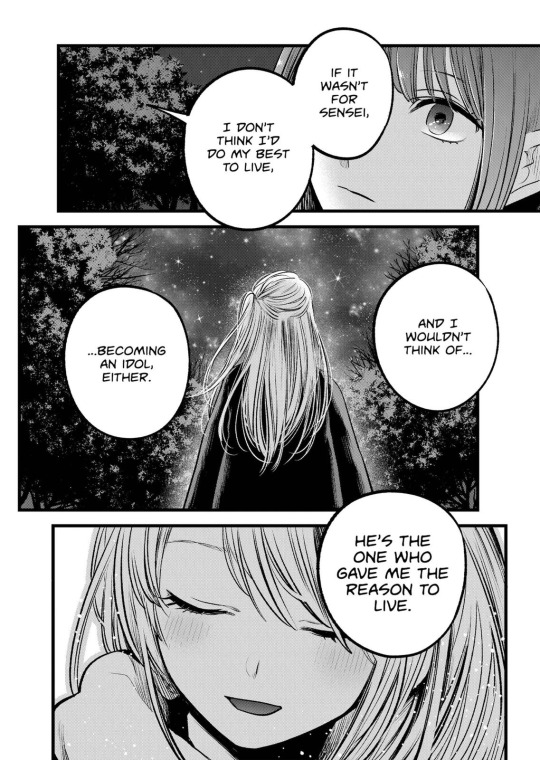
Now, this isn't on it's own a red flag, but it is contrasted directly afterward: when asked to predict his own actions and feelings, she's hilariously off:
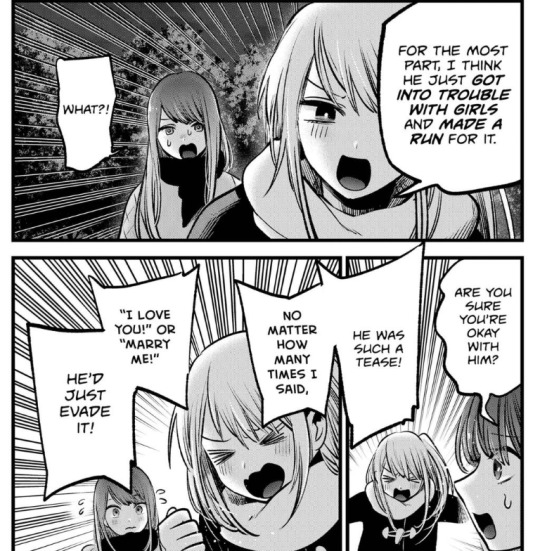
I think many readers kind of wrote this off as a joke at the time, but this kind of thing lines up perfectly with her behavior in the movie arc. Not only is she inventing a backstory for him (does Gorou ever show romantic interest at all? Why would she assume he was in trouble with girls?) but more importantly she interprets his kind rejection as a tease, and his care to a friend and patient as romantic intent.
A version of the story in which Ruby is Aqua's love interest would literally validate Ai's famous quote, that lies are love - that the person doesn't matter, only how they make them feel does. And that is directly contrasted by, uh. The whole rest of the manga. But to pick a specific scene, see C9:
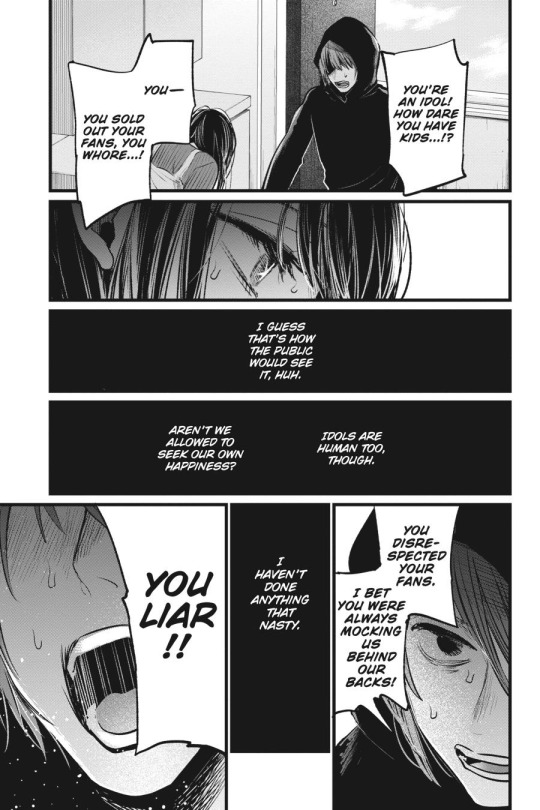
The kind of love where one person projects on another, the manga has shown us again and again, the kind of love that is lies, results in this. It cannot end happily, for anybody. If Ruby and Aqua end up dating for real, my next bet is that the story ends in tragedy, because that's the only end for that kind of love in Oshi no Ko.
Akane - Love is Lying
To Akane, love is an act - a lie. But hear me out, this is markedly different from Ruby's position. Akane, I think, is actually the closest of the main characters to Ai's mindset. She doesn't feel that she understands love, but she wants it, so she actively cultivates an image of herself that can show love. We know this well, of course, given her actions at the end of LoveNow. She creates a persona of love in chapter 28, much like Ai describes in 4.
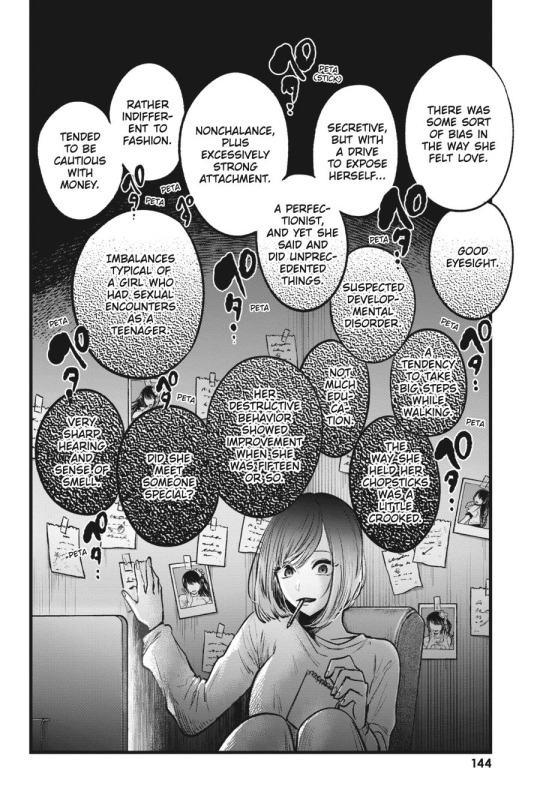

And believes that regardless of the artificiality of it, she can keep up the act forever: to earn love through the act is to earn it in reality.
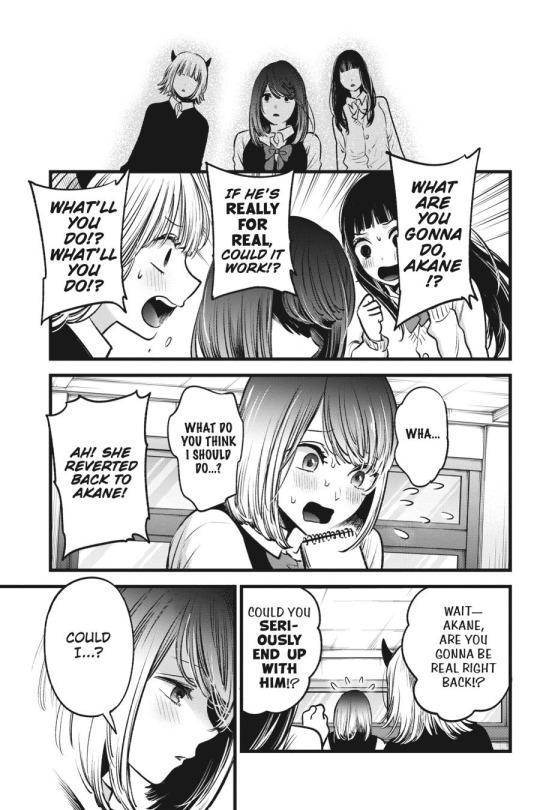

So you may be asking: what is the difference between what Akane is doing, and what Ruby is doing? Well, the difference is in the intention. It is not the lies that are the important part, but the lying - neither Akane nor Ai felt they knew how to love, but their desire to love, their care for others, that was all real love. The performance they put on for others was not an impersonal pedestal, but an active effort done for another's sake. It may be lying, but it is an act of love nonetheless.
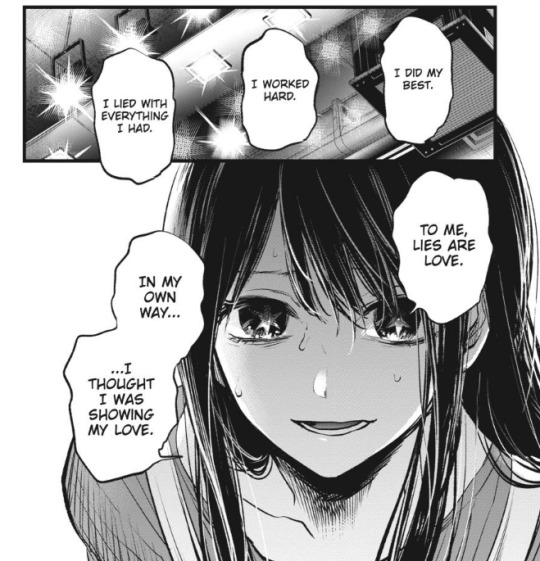
If Aqua/Akane was the endgame ship of Oshi no Ko, it would be a simultaneous validation and rejection of Ai's worldview. Yes, if you care enough, lying can be love, if you are willing to forge that connection. But, in this paradigm, Ai's mistake was lying one-sidedly, to a faceless crowd. The crowd cannot return your love, not in a way other than idolization, and we discussed how that turns out in Ruby's entry. Akane's relationship, on the other hand, is much less one-sided and unhealthy, because she lies for Aqua's sake alone, and doesn't hide that she's doing it. As such, her performance can be recognized and appreciated as such, and he can reach back and return her love.
As such, while the lying is a performance, their relationship isn't a lie. The two of them start to see each other's real selves. The dynamic of two people who don't really understand love or how to love, performing a relationship together until they can learn how to do it together, is a sweet one. I could actually totally see this as the main relationship of Oshi no Ko.
But the actions of the characters make clear what the issue is in this kind of love. The seeds of this breakdown are set in chapter 72, which is ironically one of the ones that sets the dynamic up - even as they are trying to create an equal relationship, Akane decides to lie to him for his own good. After all, their relationship has already been established on the basis of lies. To lie for someone else's sake is inherently a one sided choice, and while in chapter 28 we can see it as a cute start to a relationship, it comes back around in a much more harmful way here:
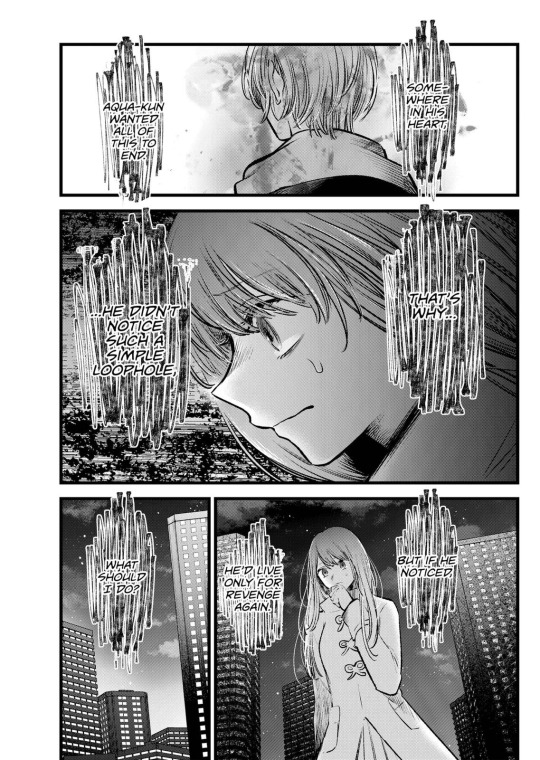
which pays off in their grand breakup in chapter 98. Akane is willing to one-sidedly make the choice to kill Hikaru for Aqua's sake. Aqua, in return, refuses to let her make that choice, tracking her position, then stopping her and cutting her off for her own safety. While Akane is the one who calls him out for this, neither of them are treating the other as someone with agency, and both are making choices for the other. As such, in Oshi no Ko, lying cannot be love - you cannot impose your love on another.
Kana - Love is Sincerity
Kana, differently than Ruby and Akane, is defined in her moments of honesty and sincerity. She is an actress, yes, but even her acting is a kind that emphasizes her true self. There's too many pages to post here, but chapters 60-63 talk all about this directly - her modern acting is about hiding herself in order to aid others, but her best acting is when she ignores everybody else and acts to her heart's desire.
This same sincerity is what forms the basis of the Aqua/Kana ship. Unlike the two above ships, which are on some level founded on artifice, many of the moments between Kana and Aqua are focused on moments where they are each acting as their truest selves. Chapters where they interact, like 30 and 117, show that they both have an easy rapport, acting thoughtlessly and honestly. Chapter 40 points this out directly: Kana has the ability to draw Aqua out of his depressed and overthinking mindset, letting him be his unrestrained self.

This is similar to Ai's own actions in chapter 4. Though she normally puts on a facade and acts out love for the cameras and crowds, the one moment that she is truly recognized as smiling is the moment she accidentally lets slip, and shows true love for her children:
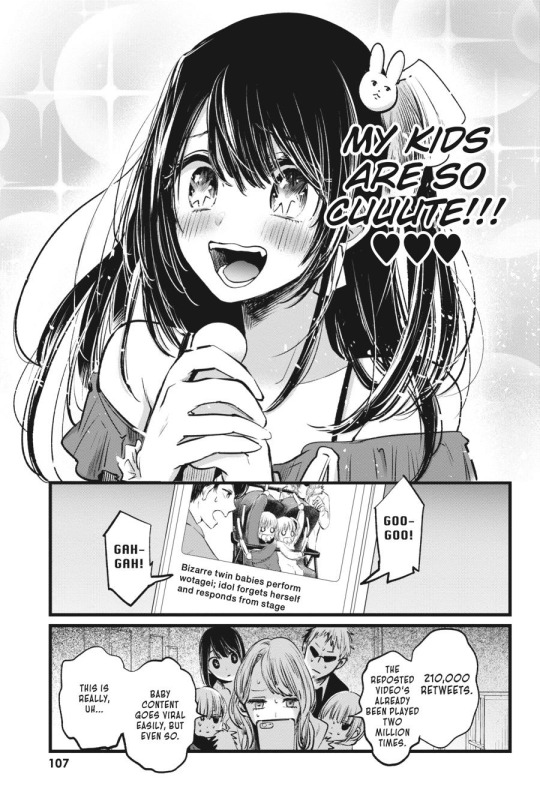
As such, Aqua/Kana serves as a complete repudiation of Ai's mindset. She was wrong that one can lie to love. The only way to love is to be honest, the only time she was able to honestly express love was the moment she died, when she was able to tell her children she loved them. If you aren't sure how to love, you must reach out honestly and you will find it. No act or performance can be love, no matter how well meant.
If this is the ship the manga ends on, which it could be, the message would be that love is in baring oneself to others. Hiding from others with lies, even when well intentioned, like Aqua does to Kana before chapter 107, is a mistake, and to love truly you need to face up to your own feelings and see the other person directly.
Finale
So, what does this all mean? It means that the romantic love demonstrated in the three ships are unavoidably intertwined with the story's ideas about love as a whole. However, his isn't necessarily a foolproof prediction of what the author plans to do next, or what ship the story endorses. Though obviously I think some of these are much more supported by the series than others, until we reach the end it is still possible that things will change, and it could go with any of these, or none of them. This is merely the lens in which I interpret the romantic interactions in the text.
In fact, it's entirely possible that the series ends with no romantic resolution at all, rejecting all three above views on love. After all, while the romantic relationships are undeniably important to the narrative, the love that started this whole story was Ai's familial love for her children - thus, I wouldn't be surprised if platonic love between family and friends will be the most important in resolving it. In any case, the question of how to love is a key part of the series, and will have to be resolved by the story's end.
#oshi no ko#ruby hoshino#akane kurokawa#kana arima#ai hoshino#aqua hoshino#step.animanga#step.blogger
78 notes
·
View notes
Text
In Defense of Ruby Hoshino
Or: Yes, the Aqua/Ruby interactions from the last couple dozen chapters ARE necessary for characterization and thematic reasons, why do you ask?
The Oshi no Ko fandom has kind of frustrated me over the last few months. It feels like every chapter that comes out and any discussion of it now has people making over the top angry exclamations talking about how much they hate incest, calling it "bait" and irrelevant to the story. Now, while of course anybody is free to have their own preferences and things that bother them, I do think some of this is taken out of proportion, and perhaps blinding them to the actual narrative importance of Ruby's supposed feelings for Aqua. Which, I do think this is a critical, load bearing part of Ruby's character arc, and corresponding the themes of the story as a whole, so it bothers me when I see so many people dismissing it as "brocon fanservice" or shipping nonsense.
I think perhaps out of an instinctive disgust reaction, people have trouble engaging with it. The way people act seems to be that either this is a serious romance plot, and the series will end with them dating, or that it is merely for sexual titillation and shock value on the part of the author, with no greater meaning, but it's pretty clear that it is neither of those things - Aqua/Ruby is not a romance, they will not date, they do not have romantic feelings for each other. However, that doesn't mean that what's going on between them is pointless.
The issues that Ruby has, both in their relationship and just in general, hinge pretty explicitly on Ruby's assumptions about her own feelings in her past life. she cannot develop past those without first confronting them.
And this is not a new thing. The groundwork for how Ruby has been acting in the movie arc was laid down long before, and needs necessary followup. To simply not have her talk about potential feelings for Aqua, as some fans wish, would have meant leaving many threads hanging, and made for a worse story. Almost everything about how they've interacted was something that could have been predicted from chapter 77. In it, Ruby makes it clear that she believes her feelings for Gorou are romantic, and that she intends to try to initiate something in her new life. However, at the same time, the fact that it was never going to happen is also, I feel, fairly clear.
In the past, in the flashback scene, Sarina claimed she was in love with Gorou. He told her he would reciprocate when she turned 16. In my opinion, I do not think either of the feelings the characters expressed in this scene were meant to be believed by the audience at all. Sarina is 12 here, she might have a puppy crush on the doctor but I think true romantic interest was probably beyond her. Meanwhile, Gorou isn't actually a pedophile? His statement was made with both parties knowing that she would die long before then, a way to make his rejection hurt her less, and as a desperate attempt to motivate her to keep living as long as she could. Though it is clear that both are the most important people to one another, and that this is an expression of their real care, I very, very, much doubt there was any actual romance in this scene.
Does this not seem very relevant for a series with the theme of people not understanding love? Back then, Gorou was Sarina's one true bond. Her parents had abandoned her and she had no friends to visit her. This was the one example of real mutual care she had, of course she would call it "love." (I mean, I'd also call it love, but not a romantic love. Familial, if anything, but friends works too - the actual name on it is unclear, what matters is that they cared for each other, but not like that.) Now, in her new life as Ruby, she has many more people who love her and who she loves in return, but having died both painfully young before, she hasn't had the opportunity to really grapple with all the old feelings about the doctor. It's pretty obvious to me whenever we see Ruby thinking of Aqua now. Just look at this page from 126:

In Ruby's own mind, he's drawn in a completely different style, like a manga romance hero. Her feelings about Aqua are fantasies, dreams, and projections, not substantial or tied to reality.
Much has been made of how Aqua, despite being Ai's son, still puts her on the pedestal of an idol, and can not see her flaws and interiority, even as he tries to avenge her death. Part of this movie arc is having characters like Ruby, Kana, and Akane start to see Ai from new angles, and relate to the human part of her. But for Aqua and Ruby to truly develop past their issues, this isn't the only pedestal they need to tackle. Ruby's regard for the doctor is a direct mirror to Aqua's feelings towards Ai. Even with the object of her affections right in front of her, she can't she past her own assumptions.
And of course, while Ruby is slowly coming to understand Ai and still failing to understand Aqua, there's one more person in the room who Ruby needs to come to an understanding about: herself, both as Sarina and now. Her refusal to see Aqua's flaws is tied up in her own feelings about the past - to acknowledge him as imperfect would mean understanding that part of the reason Sarina loved Gorou was tied up in her own desperation to love and be loved. Furthermore, while she has many more ties in her life as Ruby, I don't think its a stretch to say part of her is still stuck in that past state, holding people at arm's length.
While she has friends now, the bonds she thinks of as strongest are the ones from back then - her idolization of Ai, her love for Gorou. When Aqua reveal's Ai's secrets, in 106, Ruby says that despite being siblings, raised together for 17 years now, she didn't think of Aqua as family on his own terms - she felt a bond solely because they were linked through Ai, and does not hesitate to cut him off. She doubles down on this in 122, calling them "strangers who happened to be born in the same place." Similarly, while Ruby has been shown to be friendly with coworkers like Kana and Mem, as well as classmates like Frill, on some level she is keeping them at a distance. Beyond the simple fact that she can't talk to them about her previous life, she's been keeping plenty of emotions held in for a long time - pretty much every Ruby appearance from the Miyazaki Return arc to today has shown her not wanting to acknowledge her own struggles. Her pain from her life as Sarina is easy to keep buried. When nobody else knows Sarina exists, all she has to do is not think about it, not talk about it, not say anything, and it's almost like it never happened. Not til her breakdowns in chapters like 115 and 121 does she speak it aloud, but always either with plausible deniability or when she thinks she's alone.
I don't think her bonds as Ruby are fake - part of what she says to aqua, I think, is a defensive cope - but much like how she says she is in love with Gorou now, that is what Ruby believes. To her, all the friendships and bonds she's made in her new life are transient and fleeting things. She can never feel secure that they are based in real feelings, that they won't simply drop her when she becomes inconvenient, as everyone in her past life did. This perception contributes to her own willingness to reject others. Putting her friends at a distance during her revenge arc, cutting ties with Aqua over the Ai reveal, these are all things she does because she has no faith in the foundations of these bonds, and without understanding them she is willing to throw them away for Sarina's old memories - for the sake of the one person she believes will never let her down.
The only way Ruby is going to solve the story of Oshi no Ko is through coming to an understanding. Of Ai, of Aqua, and of Sarina. Ai didn't understand love until the day she died, and both of her children have in some ways followed in her footsteps, but Ruby has the chance to be the one to break this, to understand what was holding her back before and fully embrace loving her family and friends.(platonically. geez.) Reckoning with her feelings for Gorou (and by extension, Aqua,) was always going to be a key step forward for her. These dominoes have been laid down for 60-70 chapters now, at least, and I am excited to see where it goes.
54 notes
·
View notes
Text
I mean, it’s kind of an insult? Or, rather, given that Denji doesn’t exist its not meant to be an insult against him so much as mild criticism of part 1 of chainsaw man.
I enjoyed part 1 a lot but one thing that kept me from fully appreciating it was what felt like to me at the time as a lack of strong and emphasized characterization in the series. I can't call the characterization shallow or anything - looking around on this site will turn up dozens of in depth analysis on just about any side character you can think of. there was clearly quite a bit of thought put into it. So this might just be my own failure in reading comprehension. But for the most part, I felt that of all the characters in part 1, there were only two that really mattered, Denji and Makima. Those are the two that set the tone: even the most important and fleshed out characters, like Power and Aki, felt (to me, this is just one opinion) like they didn't fully get the time and focus. And Makima, for all her importance to the narrative, is intentionally vague: her true motivations and personality kept obscured for the vast majority of part 1.
And that leaves Denji to set the tone - and while I love him, he works best with others to bounce off of. (I originally had some examples discussing this, but I've decided to silo that off into its own post.) this is basically just restating what OP said, but having more strongly defined characters with equal narrative weight makes Denji shine that much brighter. Asa is the obvious example, taking the protagonist role and placing the focus squarely on her, but imo in part 2 even the side characters tend to have greater weight: characters like yoshida and nayuta bring their own gravity to scenes in a way that I greatly appreciate.
Latest chapter of Chainsaw Man: Asa continues to fix every single problem I have had with this comic. Denji can be 100% full himself and it works ~okayish when he is the main character, put a sadsack girl going 'disgusting!' besides him and now its not cringe, its dynamic, and also hilarious. Innovation at its finest.
265 notes
·
View notes
Text

When I think about Akane's character, I think of this moment fairly often; it's one of my favorite pages for her. "I don't know how love feels or how to love, but if I did, I'd love you," is such a fun character dynamic, that serves well both as complement and contrast to the attitudes of some of the other characters in the series like Ai and Aqua.
31 notes
·
View notes
Text
it's kind of funny that one of the central conflicts and source of tension in BNHA is essentially an argument about definitions.
Specifically, the definition of "hero" BNHA waffles between "hero, a heroic person" versus "hero, the in-universe job" - which is a pretty glaring oversight when said job is basically described as a combination between the police and celebrities.
Once I realized that the series wasn't super interested in interrogating the difference here it kind of took out a lot of the drama for me. You can go all the way back to chapter 1 with this. "Can a person without a quirk be a hero?" Well, anybody can be a hero, as in a person who helps others, but you'll probably have trouble getting the job that revolves around flashy superpowers. 50 chapters later, Stain complains that heroes are corrupt, and like. Yeah, "heroes don't act heroic" makes sense as a complaint, but when you break it down into "[people with the job of enacting state-sponsored violence] don't act [in a way meant to prioritize the wellbeing of people,]" it becomes almost a trivial observation.
And it stands out a bit because it's not like the series avoids discussing problems in it's society, such as the bigotry brought up in the Villain PoV arc, which comes to a head in the final arc's hospital attack; or failures of heroic institutions like in Nagant's introduction, or even criticizing the mindsets of those in the hero system, like in the Jin vs Hawks fight.
But when it comes to the problems in it's heroes, it can't step away from defending the flaws of hero, the job, by using the positive elements of heroism, the trait, blunting a lot of the messaging.
I had been thinking about this for a few months now, so I was surprised when the most recent chapter actually brought it up directly:

And then go right back to conflating the two. Alright then!
24 notes
·
View notes
Text
Tower of God is kind of in a weird position character age wise because all the characters are centuries old immortals, but also time is perceived differently in the tower so we aren't meant to read them as wise elders or anything, generally I think we're supposed to take them about as mature as they look, which is early-mid 20s.
For the most part we clearly aren't meant to see the characters as children - Season 2, whose anime recently started airing, starts with Wangnan having to take out loans because he can't pay his fantasy rent; the character's lives are clearly meant to be those of adults, not coded teenager. But even though the characters themselves are adults, the series itself is still basically a shonen with a target audience of fifteen year olds, so I think some audiences often see the characters in a much younger light - viewed a bit younger to be of an age with the average reader. And since the age perception of tower regulars is basically all over the place that isn't really a contradicted reading either, technically.
#also. wangnan is by far the oldest of the s2 team. but he generally is coded as the young adult compared to akraptor and horyang's older age#tfw you're a 300 year old 30something and you're trying to be a responsible role model for your friend the 2000 year old 20something#I kind of applaud SIU's choice to just say “age is weird in the tower don't think about it too much”#tower of god#step.animanga
22 notes
·
View notes
Text
holy shit that chapter ending????

The reveal that the volume 1 interviews were done by HIKARU completely changes the dynamics of some of them
Obviously for Aqua it's just text on screen, the fact that he says acting is revenge isn't just something he's saying but a threat to the person in front of him. But this also implies some weird things about the other chapters
The fact that Ruby was acting so cheerfully probably fully confirms to me that she doesn't recognize the real life Hikaru from the fictionalized one. If this is the case for the others it makes sense but its still So Much for some of them.

The fact that Kana said this to the person who arranged Ai's stabbing, for example, is so morbid, geez.
Also if we can assume it's the same interviewer in all scenes, not just the ones in this staff room (Aqua, Kana, Ruby, Gotanda) means Ichigo was interviewed without knowing the person he wanted revenge on was right front of him. That would probably sting, if he had any idea.
Actually though now that I think about it the ones that stand out to me most are the ones with the random unnamed characters - the nameless long-time idol fan, and the old woman who used to teach the kids - this implies that Hikaru has been going very, very, deeply in depth investigating the twin's lives here - he is absolutely aware of their story.
26 notes
·
View notes
Text
Oshi no Ko 143 Reaction
This was a fun chapter. Ruby getting aggressive finally forcing Aqua to stop ignoring the problems in their relationship that have been simmering for 20 chaps now and actually have a conversation that puts it all out in the open. They're mostly saying stuff I predicted in advance, but some of it took me by surprise.
One bit that made me stand up and !!! was this page:
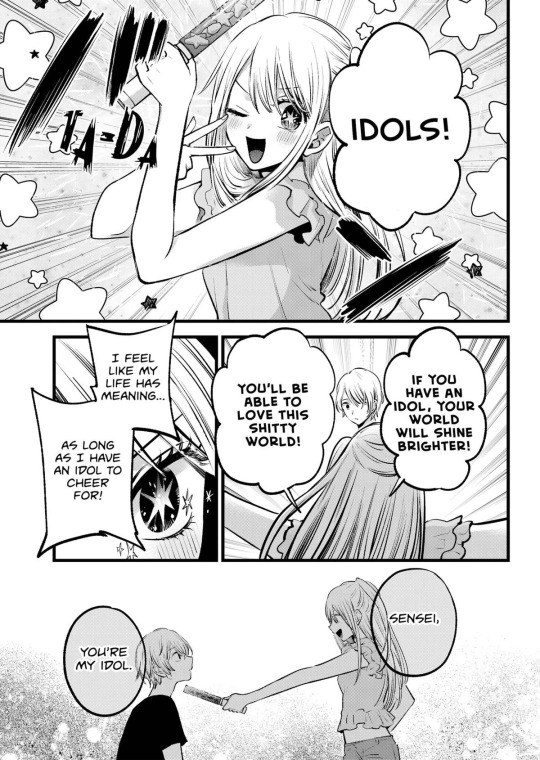
I thought I was doing something interesting when I compared Ruby's feelings towards Gorou to Aqua's feelings about Ai in my last two analyses but she just came out and said it directly on page, haha. I feel pretty validated.
I still stand behind most of what I wrote last week after this chapter. Ruby is desperately trying to make this a romance, but her best pitch is "I care about you in the same way we cared about idols in our past lives. Parasocially and without regard for the actual person, because I need to put somebody on an idealized pedestal or else I'll kill myself. This is what romance is, right?" Girl with so so so many issues, I love her.
The one thing that did really take me by surprise was the bit where she listed off Aqua's flaws as a person. In the past I assumed that Ruby was intentionally ignoring these flaws and making up a version of Aqua that didn't exist in her head. The way in her mind he's drawn like a romance hero and how she makes excuses for all the things she took issue with before lead me to believe she was intentionally distancing "Gorou, her idol" from "Aqua, the person, her brother" in her head. I'm not sure how to square this knowledge with the way she is (textually, now!) putting him on a pedestal. If I had to guess, I would think she actually is aware of who Aqua is as a person - she was friends with him as Gorou before and siblings for 18 years, she should know him better than anybody - but is intentionally separating this knowledge from the figure she is idolizing, because she needs to keep ahold of something for her mental stability.
I'm reminded of an analysis post of OnK ep 1 I read on tumblr almost a year ago, I forget who posted it so I can't properly credit it but it's not my own thoughts. (if anybody else remembers it please let me know so I can link it!) They contrasted Gorou's parasocial fan relationship with Ai to Ryosuke, the stalker who killed him: both put were fans of Ai, the Idol, but when confronted with the reality that she was more than an idol, that she had relationships and would have children, Gorou decided that the health and happiness of Ai the person was more important than his image of Ai the Idol, and did his best as a doctor to help her, while Ryosuke's reaction to having his image of the Idol shattered was to try and destroy Ai the person. The analysis put forth the idea that this was contrasting healthy vs unhealthy methods of being a fan - that there's nothing wrong with being a fan of someone, necessarily, but you have to keep in mind that you aren't entitled to anything about them, and there's always a real person underneath the performance.
I didn't fully agree with it - in my post about how the series portrays different kinds of love I talked about how it came down very harshly on dishonest and idolizing love - but I did think it was very interesting (obviously as I still remember it almost a year later). Anyway Ruby's approach to Aqua this chapter made me think of that a lot. She makes a big deal out of how Aqua is her idol, their relationship is idol/fan, and she can ignore all his flaws - but at the same time she points out that she does actually know what those flaws are. It puts her in something of a strange position. What would she do if her image of The Doctor, Her Idol, no longer existed, and she was left with just Aqua? Would she care for the person, or be mad at losing the illusion? According to this chapter she fits into neither of those, she chooses to pretend that the illusion still exists even while staring directly at the reality. Ruby seems aware that she is essentially using the idea of the doctor as a coping mechanism, but doesn't want to admit that this desire is directly in tension with the idea about caring about Aqua as a person, romantically or otherwise.
As for Aqua, it's great that he's finally being a little honest with his emotions and feelings after so long, to the one person who is really able to understand the context.
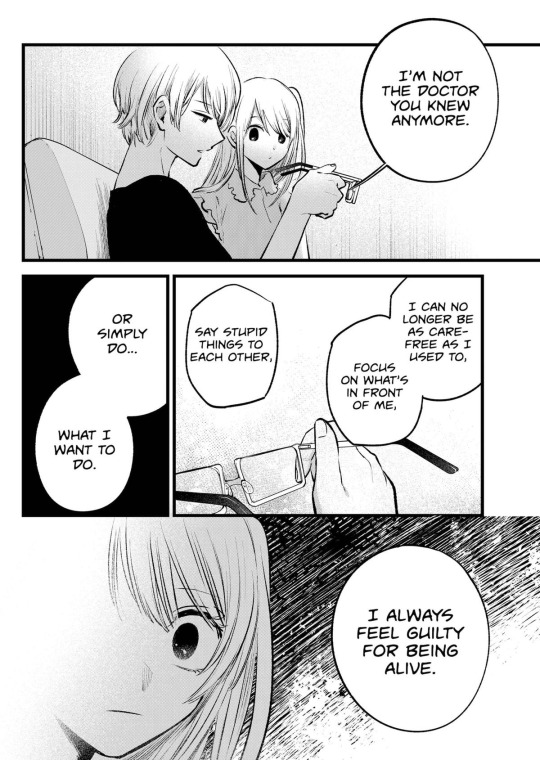
However, I think he's still holding a lot back, especially in the latter half of the chapter, because there are things he doesn't feel that he can say to Ruby, specifically about their relationship. He seems hesitant to directly tell Ruby that he can't be her lover or her idol, he can only be himself - even when he tries to tell her that he can't be the person he was she just brushes it off - and I think with how Ruby's mental health is holding on by a thread he is unwilling to do anything to jeopardize it, even if it means accepting the spot on her pedestal.
My read of the relationship between Gorou and Sarina 22 years ago was that they were genuine friends at the time. Regardless of difference in age and position they were both socially isolated people who found one person they felt they could be honest and open with. This makes their current relationship even sadder - Ruby has twisted the memory of their old friendship into dreams of romance and idolatry to fuel the desire to live one more day. Aqua, who in his last life would have been willing to do almost anything to get her to keep living, is forced to cut away his own relationship to her, both last life friend and current life brother, because being dishonest - being an idol - is the only way he can see to keep her alive and healthy. Both have already cut away most of their other bonds for the sake of the revenge plan, and now they can't even be fully honest with each other. Very tragic stuff.
All in all I really really liked this chapter. The interactions between Ruby and Aqua has always been multiple layers of relationships and mindsets existing on top of one another, and that just makes it super interesting for me. I love it whenever that leads to character tension. They've been friends and siblings and idols and all of that has to coexist, its a very unique kind of character writing that Oshi no Ko does well and I don't see very often and makes me care for the series a lot. I think I have a much more positive view of this arc than most of the fandom because the trainwreck of their relationship is one of the series highlights to me, so chapters like this, where exactly how bad their mindsets have gotten are placed as the main focus, are some of my favorite story beats.
I know there's a lot of negativity about this chap but I'm having a good time over here in my corner. Not sure if it's because I've been letting my thoughts about the series out in posts a lot more recently or because I liked this specific chapter a lot but this is definitely most I've been invested in the series for a while now. I think I was letting the Discourse kind of sour things for me and now I have mentally exorcised it from my mind.
42 notes
·
View notes
Text
it is kind of amazing how badly bleach was it's own worst enemy. like I still have deep affection for that manga but holy shit did it squander almost every possible character and plot beat it could have had by the end.
20 notes
·
View notes